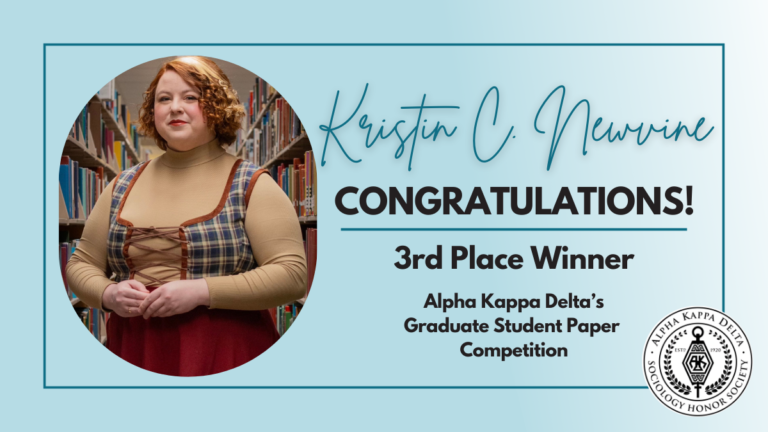
Editorial Note:
This blog feature was created by the Alpha Kappa Delta (AKD) Media Editor, Stephanie Wilson, in celebration of the third place winner in AKD’s 2024 graduate student paper competition, Kristin C. Newvine.
Each year AKD sponsors a graduate student paper competition. Winners are eligible to win cash prizes and travel money to attend the American Sociological Association annual conference. The third place winner received $100 and up to $1,000 in travel expenses to the 2024 annual meeting of the American Sociological Association.
Continue reading to learn more about Kristin C. Newvine’s winning paper!
Meet Kristin C. Newvine

Kristine C. Newvine is a recent graduate of Ball Sate University in Indiana. Having just earned their Master’s Degree in Sociology and History from Ball State, they are proud to be joining the Sociology PhD program at Penn State in Fall 2024. Kristin’s research interests include social psychology (identity and self), character performance, Colonial Williamsburg, and Holocaust studies and their paper “Telling their Stories and Saying their Names: How Race, Gender and First-Person Character Performing Impacts Historical Interpreters’ Identities” earned them a 3rd place prize in the 2024 AKD graduate student paper competition.
To learn more about Kristin and their research, we reached out for a brief interview. Continue reading below to learn more about Kristin, their research, and their future goals as a sociologist! You can also connect with Kristin on Instagram.
Can you briefly summarize your award-winning paper?
My paper argues that historical interpreting, at a living history museum, in a first person fashion, has an impact on the performers’ identities. I investigate, through qualitative methods, how enacting 18th century social inequalities consistently, changes the performer’s sense of self, in relation to race and gender.
What motivated you to write on the topic of your paper?
I have been a historical interpreter since 2017 at a small 18th century recreated Fort in Central Pennsylvania. I started to notice that the predominately white volunteer staff at the Fort did not often discuss slavery, even though it was still very prevalent in northern states during the late 18th century. I took a trip with my family in the summer of 2020 to Colonial Williamsburg, the largest living history museum in the world. I realized that there were interpreters that identified as Black actually portraying enslaved individuals as if they truly were the people they were playing.
I started to observe, and wonder if there was any impact on the performers, regardless of race, associated with enacting 18th century social inequalities. As someone who specialized in sociological social psychology, I began to postulate that this practice may have some impact on the performers’ identities and sense of self.
If you had to choose one major takeaway to share from your paper, what would that be?
The major takeaway that seems to mean the most to the interpreters interviewed is that it is imperative to “tell the stories and say the names” of the underrepresented groups of the 18th century. Most importantly, we as society must make an effort to remember the lives of enslaved individuals and others who have been lost or disincluded from the historical record. This remembrance is considered a privilege to those who portray the 18th century people from marginalized groups, and not simply a burden upon the performers.
What have been your biggest “aha” moments while studying sociology?
I experienced a “light bulb on” moment when I was first assigned sections of “The Presentation of Self in Everyday Life” by Erving Goffman in my Introduction to Sociology class. I suddenly realized I had been performing my entire life, and not only when I was on a theatrical stage. Life changed for me in that moment and I have never seen it the same since.
Another light bulb moment came for me when I started working with Dr. Mellisa Holtzman on my thesis project. We started to realize the impact of historical interpreting on the performers, and that has also allowed me to see the world differently. I deeply appreciate Dr. Holtzman’s support of this project!
How do you see yourself using sociology in your future career after earning your graduate degree?
I will be starting my PhD at Penn State University this fall and I hope to become a faculty member after. Specifically, I would like to become a professor who values teaching and research equally. I want to continue to help tell the stories “with” the populations that I research, instead of “for” them.